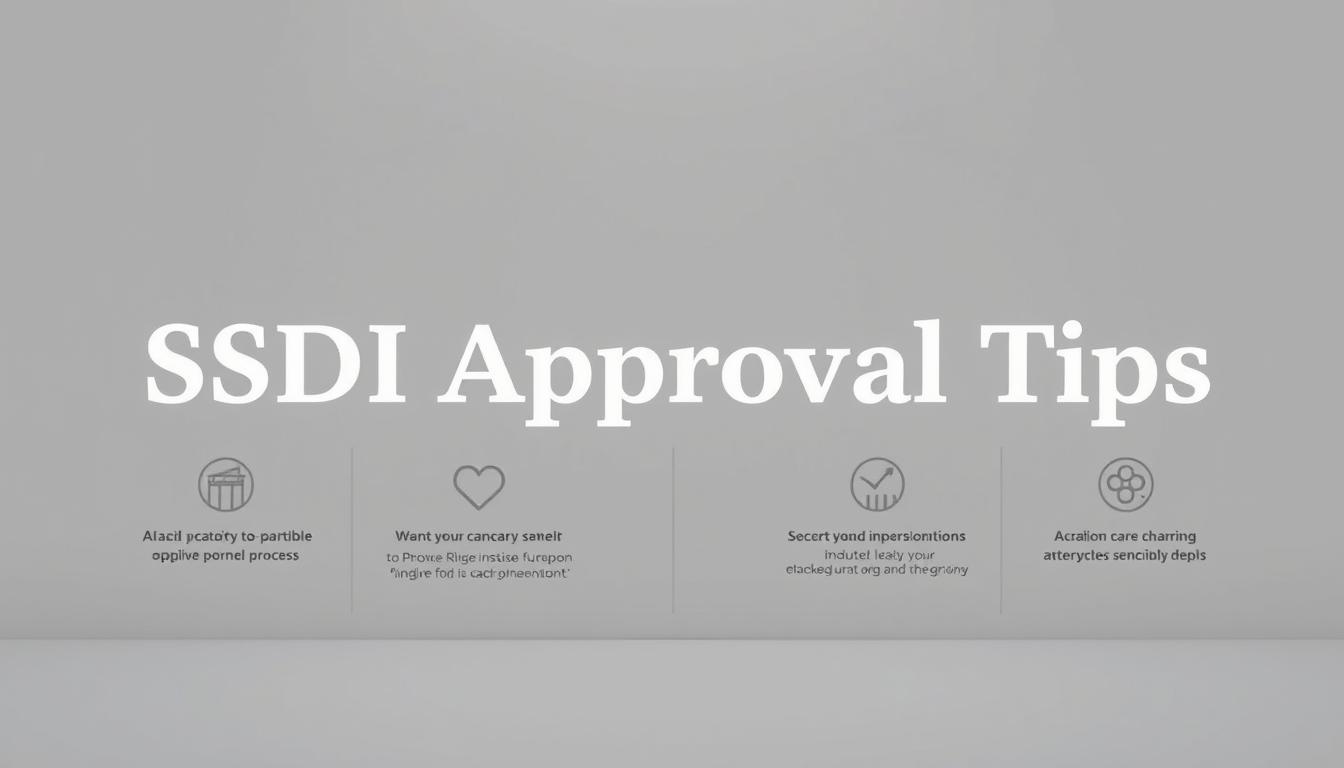Nearly 70% of initial SSDI claims are denied. This leaves many applicants feeling frustrated and unsure. It shows how complex the SSDI application process is. It also highlights the need for a strong case.
I will guide you through the process. I will share practical tips to boost your approval chances. By understanding SSDI claims and preparing well, you can greatly improve your success rate.

With the right approach and preparation, the SSDI application process can be easier. This article will give you the tools and insights you need. It will help increase your chances of a successful SSDI claim.
Key Takeaways
- Understand the SSDI eligibility criteria to ensure you’re qualified.
- Gather comprehensive medical documentation to support your claim.
- Prepare for the application process by organizing your records.
- Consider seeking professional help to guide you through the process.
- Be prepared for potential appeals if your initial claim is denied.
Understanding Social Security Disability Insurance (SSDI)
It’s important to know the basics of Social Security Disability Insurance (SSDI) to apply. SSDI is a federal program that helps those who can’t work because of a disability. It’s for people who have worked and paid Social Security taxes.
What SSDI Is and Who It’s Designed For
SSDI is for people with a work history and Social Security taxes paid. You need a medical condition that makes it hard to do basic work. The Social Security Administration (SSA) runs this program.
How SSDI Differs from SSI and Other Benefits
SSDI is not the same as Supplemental Security Income (SSI). SSI is for those with little income and resources. SSDI is based on your work history and Social Security taxes. Here’s a table showing the main differences:
| Program | Eligibility Criteria | Benefits |
|---|---|---|
| SSDI | Work history, Social Security tax payments, disability | Cash benefits based on work history |
| SSI | Limited income and resources, disability or blindness | Cash benefits based on need |
| Other Benefits | Varies by program (e.g., veterans’ benefits, workers’ compensation) | Varies by program |
Knowing these differences helps you apply for the right benefits. It makes the SSDI application process easier.
Meeting SSDI Eligibility Requirements
To qualify for SSDI, you must understand several key factors. You need to meet specific criteria about your work history and medical condition.
Work Credits and Recent Work Test
Having enough work credits is a main requirement. The number of credits needed depends on your age when you became disabled. Usually, you need 40 credits, with 20 from the last 10 years.
The SSA calculates work credits based on your earnings. This formula is complex but important for your application.
Medical Qualification Standards
You must also meet the SSA’s medical standards. This means your condition must severely limit your ability to work. The SSA has a list of disabling conditions. If your condition is on this list, you might qualify.
The SSA Definition of Disability
The SSA has a strict definition of disability. Your condition must prevent you from doing any substantial work. This definition is key to getting your disability claim approved.
Knowing these SSDI requirements is crucial for a successful claim. By meeting these criteria, you can increase your chances of approval.
Common Reasons Why SSDI Claims Are Denied
Knowing why SSDI claims get denied is key for applicants. It helps avoid common mistakes. A denial can be a big setback, but knowing the reasons can help strengthen your application or appeal.
Technical Denials
Technical denials happen when you don’t meet SSDI’s technical needs. This includes not having enough work credits or not being covered by Social Security. It’s vital to check these requirements before you apply.
Medical Denials
Medical denials often come from lacking medical proof or not fitting the SSA’s disability criteria. It’s important to provide detailed medical records. Show how your condition impacts your work ability.
Procedural Mistakes
Procedural errors, like missing deadlines or not following the right steps, can also cause denials. It’s crucial to follow the disability claim process carefully. If unsure, get help to avoid these mistakes.
If your SSDI claim is denied, figuring out why is the first step. You can then decide whether to appeal or reapply.
How to Win Your SSDI Case: Building a Strong Initial Application
To win your SSDI case, a strong initial application is key. A well-prepared application boosts your approval chances. It also might avoid long appeals.
Gathering Complete Medical Documentation
Getting all your medical records is crucial. This includes test results and statements from doctors. Make sure your application shows your condition, treatment, and work limitations.
Key documents to include:
- Medical records from all treating physicians
- Test results and diagnostic reports
- Statements from healthcare providers detailing your limitations
- Records of any hospitalizations or surgeries

Properly Describing Your Limitations
It’s important to clearly describe your limitations. Talk about how your condition affects your daily life and work. This shows the SSA how severe your disability is.
For example, instead of saying “I have back pain,” you could say “I experience chronic back pain that prevents me from standing for more than 30 minutes or lifting objects over 10 pounds.”
Avoiding Common Application Errors
Many SSDI applications are denied due to mistakes. These include missing information, not enough medical evidence, and not following instructions. Check your application carefully before you send it.
Tips to avoid common errors:
- Double-check all information for accuracy
- Ensure all required medical documentation is included
- Follow the SSA’s application instructions carefully
By focusing on these areas, you can greatly improve your SSDI application. The goal is to show clearly how your disability affects your work.
Working Effectively With Your Medical Providers
Medical providers are key in the SSDI application process. Working well with them can greatly help. It’s important to know how to work with them to get the right medical evidence.
Communicating Your Symptoms Clearly
Telling your medical providers about your symptoms clearly is crucial. Be detailed and honest about your condition. This helps them understand you better and provide accurate documents.
- Be prepared to describe your symptoms in detail.
- Keep a record of your symptoms to reference during appointments.
- Don’t hesitate to ask questions or seek clarification.
Requesting Supportive Medical Statements
A supportive medical statement from your provider can really help your SSDI claim. To get one, make sure your provider knows about SSDI rules. Then, ask for a detailed statement that includes your diagnosis, symptoms, and how they limit you. Make sure it’s signed and dated.
Following Treatment Recommendations
Following your treatment plan is very important. It shows you’re serious about managing your condition. This can help your SSDI claim by showing you’re trying to get better.
Key aspects to focus on include:
- Adhering to your treatment plan.
- Attending scheduled appointments.
- Reporting any changes or concerns to your provider.
By working well with your medical providers and following these tips, you can make your SSDI claim stronger. This can improve your chances of getting approved.
Strengthening Your Medical Evidence
Medical evidence is key to winning your SSDI case. A detailed medical history can really help your chances.
Types of Medical Evidence That Carry the Most Weight
The Social Security Administration (SSA) values objective medical evidence a lot. This includes:
- Laboratory test results
- Imaging studies (e.g., X-rays, MRIs)
- Medical records from treating physicians
- Observations from healthcare providers
Objective evidence is very important. It clearly shows your health status. Make sure your medical records are full and current.
Filling Gaps in Your Medical Records
Missing parts in your medical records can make people wonder about your health. To fix this:
- Get records from all doctors and hospitals
- Make sure your medical history is the same everywhere
- Explain any missing or different information
| Action | Benefit |
|---|---|
| Obtaining complete medical records | Provides a comprehensive view of your condition |
| Explaining gaps in records | Prevents misinterpretation of missing information |
Using Functional Capacity Evaluations
Functional Capacity Evaluations (FCEs) check how well you can do work tasks. An FCE shows what you can and can’t do, helping your SSDI claim.

By improving your medical evidence, you boost your SSDI approval chances. These SSDI approval tips can really help your application.
Navigating the SSDI Appeals Process
The SSDI appeals process is a journey with many steps. When your first application is denied, knowing how to appeal is crucial.
Reconsideration Stage Strategies
The first step is the reconsideration stage. To improve your chances, focus on:
- Submitting new medical evidence that supports your claim
- Addressing any issues that led to the initial denial
- Ensuring your application is complete and accurate
Getting SSDI lawyer assistance can help a lot during this stage.
Administrative Law Judge (ALJ) Hearing Preparation
If your claim is denied again, you’ll meet with an ALJ. To get ready:
- Review your medical records and be ready to discuss them
- Prepare to explain how your condition affects your daily life and ability to work
- Consider hiring a representative to help with your case
Effective preparation is key to a successful hearing.
Appeals Council and Federal Court Options
If the ALJ denies your claim, you can appeal to the Appeals Council and, if necessary, to Federal Court. Knowing these options and getting professional help can greatly improve your appeal denied SSDI claim.
How to Win SSDI Case in Front of a Judge
To win your SSDI case, it’s key to know what the judge wants and how to present your case well. This means following a few important steps that can really help your case.
Preparing Your Testimony
Getting ready for your testimony is a big part of winning your SSDI case. You need to clearly talk about your condition, how it affects your daily life, and if you can work. It’s a good idea to practice with your SSDI lawyer to make sure you cover everything.
When you testify, be honest and clear about your limits and symptoms. Judges look for consistency between what you say and your medical records. So, it’s important that your story matches your medical evidence.
Addressing the Judge Appropriately
When talking to the judge, be respectful and polite. Always call the judge “Your Honor.” Be ready to answer questions clearly and avoid arguing with the judge.
Handling Vocational Expert Testimony
A vocational expert (VE) might talk about jobs you could do despite your limitations. Remember, the VE’s opinion is based on hypothetical scenarios, not a personal judgment of you.
Common Questions Judges Ask and How to Answer
Judges often ask specific questions to get a better understanding of your disability. They might ask about your daily activities, your ability to do certain tasks, and how your condition affects your social life.
| Common Judge’s Questions | Tips for Answering |
|---|---|
| Can you describe your typical day? | Be honest about your limitations and how your condition affects your daily activities. |
| How does your condition impact your ability to work? | Clearly explain how your symptoms and limitations prevent you from performing work-related tasks. |
| Can you perform any physical or mental tasks? | Be realistic about your capabilities, and explain any difficulties you face when performing tasks. |
By knowing what to expect and how to prepare, you can greatly improve your chances of winning your SSDI case. Getting SSDI lawyer assistance can also help a lot.
The Strategic Advantage of Hiring an SSDI Attorney
An SSDI attorney can greatly help with your disability claim. They guide you from the start to the end. Their knowledge can really boost your claim’s success rate.
When to Hire Legal Representation
It’s smart to get an SSDI attorney early, at the start of your claim. But, if your claim is denied and you’re thinking about appealing, getting a lawyer is even more important.
Key situations that necessitate hiring an SSDI attorney include:
- Complex medical conditions that are hard to document
- Previous denials without clear reasons
- Need for appeal or reconsideration
What a Good SSDI Lawyer Does
A good SSDI lawyer will help you through the application and appeals. They make sure you have all the right documents. They also explain how your condition affects your work ability.
Understanding Attorney Fee Structures
SSDI attorneys usually charge on a contingency fee basis. This means they only get paid if you win your claim. The fee is a percentage of the back pay you get.
| Fee Component | Description | Typical Amount |
|---|---|---|
| Contingency Fee | Percentage of back pay awarded | 25% |
| Maximum Fee | Cap on the contingency fee | $6,000 |
Knowing about these fees can help you decide if hiring an SSDI attorney is right for you.
Maintaining Eligibility After SSDI Approval
Getting approved for SSDI is a big win. But, it’s crucial to follow the SSA’s ongoing rules to keep these benefits.
Continuing Disability Reviews
The SSA checks in regularly to make sure you still qualify for SSDI eligibility criteria. They look at if your health has gotten better or if you can work now.
Reporting Requirements
You must tell the SSA about any changes in your health or life. This includes new jobs, income, or where you live. Not telling them can lead to losing your benefits.
Work Attempts and Income Limits
If you try to work, know the income limits and disability benefits rules. Making too much money can hurt your benefits.
| Work Status | Income Limit | Effect on Benefits |
|---|---|---|
| Below SGA | $1,350/month | Benefits continue |
| At or above SGA | $1,350+/month | Benefits may be terminated |
Conclusion: Perseverance Pays Off in SSDI Cases
Applying for SSDI and dealing with appeals can be tough. But knowing how to win your case is key. By using the tips from this article, you can boost your chances of getting the benefits you need.
To get your SSDI approved, start with a strong application. Work well with your doctors and gather solid medical evidence. If you’re denied, don’t give up. Many claims are approved on appeal.
Being informed and active is crucial for SSDI approval. With persistence and preparation, you can beat the challenges and get the benefits you deserve. Stay focused and diligent to achieve success in your SSDI case.
FAQ
What is the first step in applying for SSDI benefits?
First, check if you qualify. You need enough work credits and a medical condition that the SSA calls a disability.
How do I gather medical evidence to support my SSDI claim?
Collect all medical records like doctor’s notes and test results. Make sure your doctors know about your condition and how it affects your work.
What is the difference between SSDI and SSI benefits?
SSDI is based on your work history and earnings. SSI is for those with little income and resources, based on need.
How can I increase my chances of winning my SSDI case?
Make sure your application is complete and correct. Gather strong medical evidence. Consider hiring an SSDI attorney for help.
What happens if my SSDI claim is denied?
If denied, you can appeal. The SSA has a process with stages like reconsideration and a hearing with an Administrative Law Judge (ALJ).
How can an SSDI attorney help me with my case?
An SSDI attorney can guide you through the process. They help gather and present medical evidence and represent you at hearings.
What are the most common reasons why SSDI claims are denied?
Claims are often denied for technical, medical, or procedural reasons. This includes incomplete applications, not enough medical evidence, or not following SSA rules.
How can I prepare for an SSDI hearing in front of an Administrative Law Judge (ALJ)?
Review your medical evidence and practice your testimony. Be ready to answer questions from the ALJ and vocational experts.
What are continuing disability reviews, and how can I prepare for them?
These reviews check if you still qualify for SSDI. To prepare, keep up with your treatment and have updated medical evidence ready.
Can I work while receiving SSDI benefits?
Yes, but there are rules. You must report any work and know how it might affect your benefits.
